This great nation of ours celebrates Veterans Day this month. On Monday the 12th, federal employees will have a day off from work in recognition of this occasion. (The “legal,” traditional date is the 11th, a Sunday this year.) Whether we are relieved of work or not on that day, we all ought be relieved, as well as deeply, abidingly grateful, that those veterans served their country that we might enjoy the security and the freedoms that we enjoy as Americans. This month we acknowledge the message of Veterans Day with a recognition of the contributions of two area veterans—contributions made through their military service, and contributions made as workers and businesspeople in the Permian Basin oil and gas industry. —EDITOR
Brandon Adair
If it weren’t for a sheer coincidence—the fact that in one precise, pivotal moment, his canteen was accidentally, momentarily stuck in a turret on the military vehicle on which he was riding—Brandon Adair likely would not 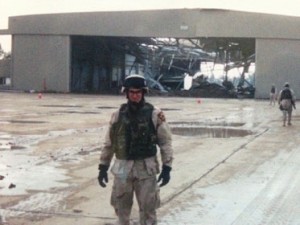 be alive today. But in that instant on an Iraqi roadway, when (rank TKTKTKTK) Adair bent over to dislodge his canteen, the detonation of a 155 mm. Howitzer shell just ten feet away knocked him out of the vehicle—but didn’t kill him. “I was real lucky,” Adair said. “Because of the direction I was bent down, my helmet took the brunt of the damage.”
be alive today. But in that instant on an Iraqi roadway, when (rank TKTKTKTK) Adair bent over to dislodge his canteen, the detonation of a 155 mm. Howitzer shell just ten feet away knocked him out of the vehicle—but didn’t kill him. “I was real lucky,” Adair said. “Because of the direction I was bent down, my helmet took the brunt of the damage.”
The shell had been planted in a hollowed-out lightpost—one that was painted over to mask the sabotage.
The incident was just one of three that left lasting marks—as well as a disabling injury—on Adair. Today, striving to achieve some kind of traction as owner/operator of a small startup business, he doesn’t just rise above his own disabilities. He brings other veterans into the business and helps them get back to work, too. It’s called Tex-Vets Hotshots. And it’s slowly getting a foothold in the hustle-bustle world of oilfield delivery services. (That’s what “hot-shots” are—oilfield deliverymen).
Adair has three other men working with him presently, and all three are, like him, disabled veterans.
Speaking with PBOG Magazine during the run of the 2012 Permian Basin International Oil and Gas Show, Adair allowed that things haven’t been easy, but that he is optimistic about his chances of success and hopeful for his goals of sharing it with others.
“Right now, we’re trying to drum up some more work so that we can expand to bring in more vets,” he said. “One of the guys that I was deployed with in Iraq, that I have kept in touch with, recently lost both his feet in Afghanistan. He is in San Antonio right now. They’re working on getting him prosthetics and getting him up and walking again. And then once he is released, what we’re hoping, obviously, is that we can bring him on board and give him an opportunity to continue working and taking care of himself and his family. It’s hard for these guys. Most of us have disabilities that came from combat. Myself, I received a traumatic brain injury and now have neurological damage. I have certain memory issues—recalling numbers, things like that. I’ve got back and knee issues from being injured, from the blasts, the explosions. All of us, we’ve been beat up, but we can still work.”
Adair walks with a slight limp, “especially on a day when [he’s] been on his feet all day.” After five years in post-military civilian life, he knows the challenges other disabled vets face.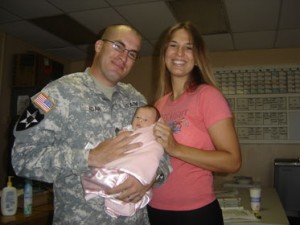
“Some of the guys, they have medical appointments they have to make at the V.A. Hospital,” he said. “Some are still receiving some form of physical therapy. It’s hard for them to hold down a normal job and make those [weekday] appointments. A lot of companies aren’t going to hire somebody who’s got physical therapy twice a week. And that’s part of the reason I have done this. Because I have had a lot of issues myself with trying to make doctor’s appointments, trying to schedule them for after-hours, which is real hard to do, and so that is part of the reason for this company.”
Adair said that in Tex-Vets Hotshots, the crew has been able to cover for one another. And it’s good to work with people who know each other’s unique challenges.
The startup is operating on the limited funds Adair himself has been able to muster, along with some cash input from another of the employees. They’re doing everything out-of-pocket.
“It takes vehicles and trailers,” Adair said. “The vehicles have to be large, heavy-duty, diesel rigs. I’ve gone out and bought a Dodge dually 3500. It’s a $60,000 truck. And then I had to get a trailer for it. Right now I am working with a 37-foot flatbed trailer. That was another 14 thousand dollars. So currently, with just that one truck and trailer setup alone, I have 75 thousand dollars invested. And then right now we are running two trucks and two trailers, and I want to bring on a third truck and trailer, so that I can bring in another guy. That would be Chris Byers—he’s the veteran who is currently in San Antonio in rehab. I’ll have to do some research, because I don’t know how well he will be able to drive with foot pedals. I might have to work in some hand controls.”
Currently Adair works a job in oilfield safety in addition to the role he assumes for Tex-Vets Hotshots. It’s taken that kind of load for him to feed his family of five, which includes little ones age one through five.
The ex-soldier describes the Midland-Odessa area as one that in general is very supportive of veterans. The challenge for him has not been been one of finding welcome receptions, it has been one of lining up steady 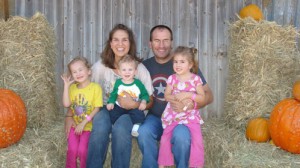 customers. “And I’m not a very good salesman,” he said with a laugh. “I’m just a guy trying to get something going for a bunch of other guys.”
customers. “And I’m not a very good salesman,” he said with a laugh. “I’m just a guy trying to get something going for a bunch of other guys.”
Adair, who was born in Washington state and raised mainly in Japan, was born into a military family—one with military roots that go back more than 200 years.
“My great, great, great, great,… going all the way back…. grandfather signed up for the Continental Army in a pub in 1775, back before we were a country,” he said. “My family just has a very rich history of military service. There wasn’t a whole lot of doubt for me [as to whether he would serve or not]. Every generation of my family since then has done it.”
His first hitch in the military was with the Marines, which he entered straight out of high school. He served three years there, and after his discharge he spent a few years in college.
But then came 9-11.
“I wanted to go back in and serve my country again,” he said frankly. “After Sept. 11, I went back, but this time into the Army.”
At first, he was stationed at Fort Lewis, Wash., but he was soon attached to the Third Brigade, Second Infantry Division, and was thereupon deployed to Iraq in an experimental unit called the Striker Unit.
He served in Iraq three years, in places like Samara. Mosul. Alkut.
“We became the quick-reaction force for the entire country,” he said. “So we were moved around quite a bit.”
After the incident with the howitzer shell explosion, there came another involving a rocket attack that injured his back, followed by another roadside bomb—this one an I.U.D.—that banged up his knee and caused the limp.
But Adair is only on 50 percent disability because he pushed through his injuries and kept going and received in the end not a medical discharge but a regular honorable discharge. Some time would have to pass before the bodily trauma and brain trauma would surface enough that he had to seek help and learned how much more injured he was than he’d known.
By then, he was already here in the Permian, working first as an e-line (wireline) engineer, then in slickline and braided line, then in well testing, and finally in safety. The little ones arrived for him and Laurie after his military duty had ended. The oil and gas business “has been good to me so far,” he said. And he’s fond of Texas, which is now his adopted home.
Jerry Fuentes
When we at PBOG Magazine encountered Jerry Fuentes at the PBIOS Show, neither Jerry nor Brandon knew each other, but they each vowed to get to know the other soon, as fellow disabled veterans.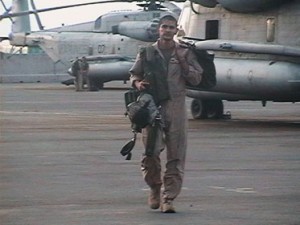
Fuentes, a former Marine Corps captain, was surprised to hear that another disabled vet was, like himself, a local business startup entrepreneur, shouldering similar loads in getting a new venture up and running. He said he’d be hiring Tex-Vets Hotshots for deliveries.
And Fuentes is a man who has need of deliveries, for his fast-growing welding operation is picking up clients quickly. Much of the work is done in-shop, using a robotic welding arm.
Veteran Fabrication: that’s the name of the shop owned and operated by Jerry with his brother, Scott Fuentes. Midland-based, it employs five and cranks out a steady volume of high-precision welding work. They also build various components for compressor systems, and they construct skids as well. The company name is a double-duty term. Obviously, it stands for Jerry’s status as a veteran. But it also is indicative of the fact that the fabricators who work there are veterans at their vocation.
The company does vessel fabrication, pressure piping, structural piping—“anything oil and gas.” Jose Gomez, a key employee, writes the programming code that runs the robotics. “We use robotics for precision, repeat-ability, extreme efficiency, and lower production times,” Fuentes said, though he asserted that manual welding is also an important part of what they do. “Because you are never really going to get away from the manual aspect and you don’t really want to. You want to have some kind of hands-on. But you can be extremely efficient with the robotics.”
Their customers include outfits such as ConocoPhillips, Compressor Systems, Patterson UTI, Natural Gas Services Group, and other large companies, as well as a raft of smaller ones.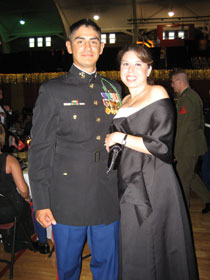
Earlier this year they built a new shop. “We were leasing before, but we bought the property, built the shop, and we have been operating out of it ever since. Luckily we built it before things really picked up. So it was perfect timing for us. Even so, with everything we have, we are still looking to grow a little bit bigger. We might add another robotic welding cell, and add some other people—manual welders.”
A Purple Heart recipient, and a veteran of two tours of duty—one in Africa (2004-05) and one in Iraq (2006-07)—Jerry was injured in Iraq in 2007 by an I.U.D. explosion when he was on foot patrol. “At that time, due to my injuries, I was no longer able to serve, so I retired,” he said. “Upon coming home, my brother and I decided—because I had been in the Marine Corps so long [14 years] that we hadn’t been together for a while—that we should make the best of it and start a business together. So we started Veteran Fabrication—this was in 2008—and at first business was slow. But we fought through that, and now things are good. We stuck it out, always looking for different ways to be more efficient.”
Looking Ahead
Like Brandon Adair, Jerry Fuentes has made strides in his post-military working life, but still (with his company) sees progress still to be achieved, benchmarks still to be attained. Neither man indicated that his path has 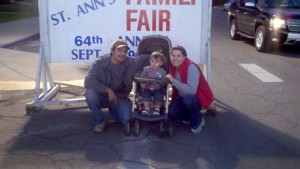 been easy. Still, as we all set aside time to recognize our country’s veterans, it is good to know that the oil and gas business is a place where some of them have sought a livelihood. May they prosper in the land that they have served.
been easy. Still, as we all set aside time to recognize our country’s veterans, it is good to know that the oil and gas business is a place where some of them have sought a livelihood. May they prosper in the land that they have served.









